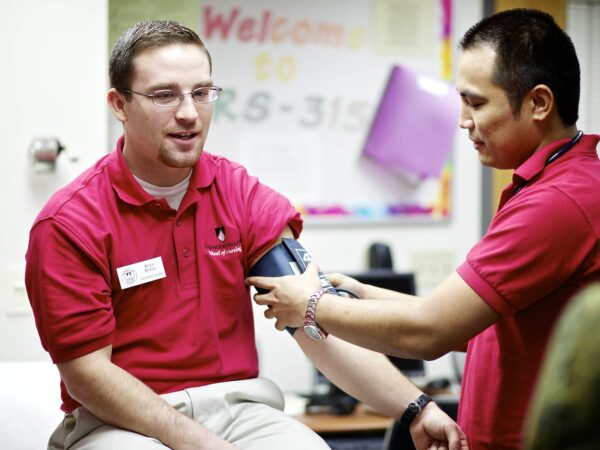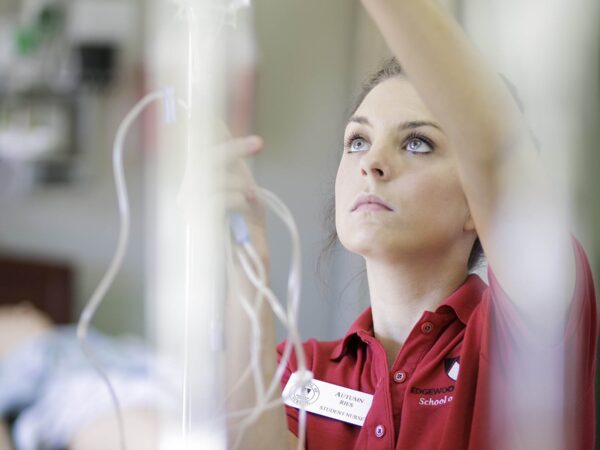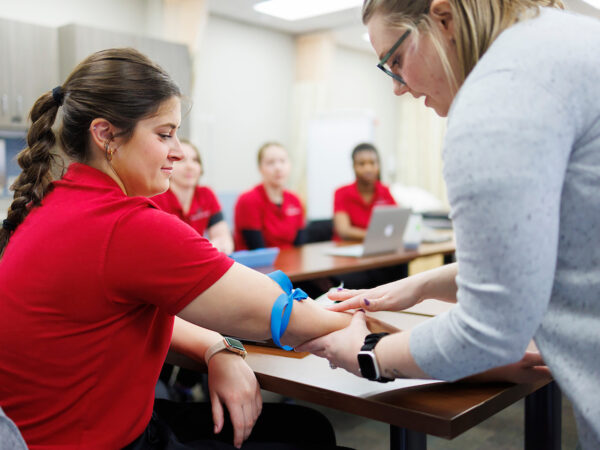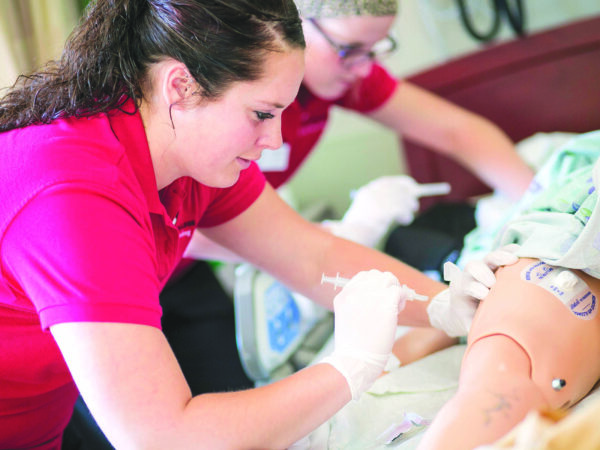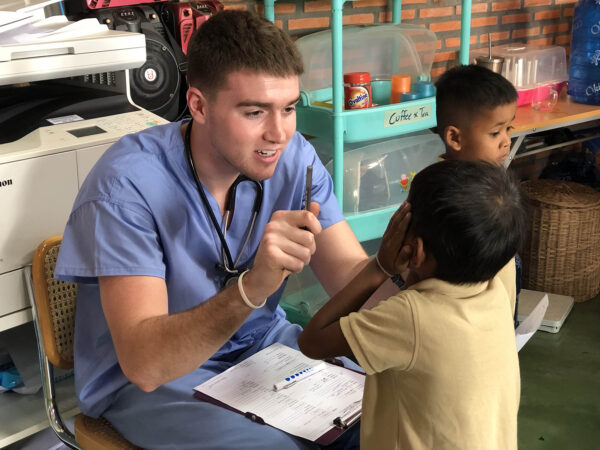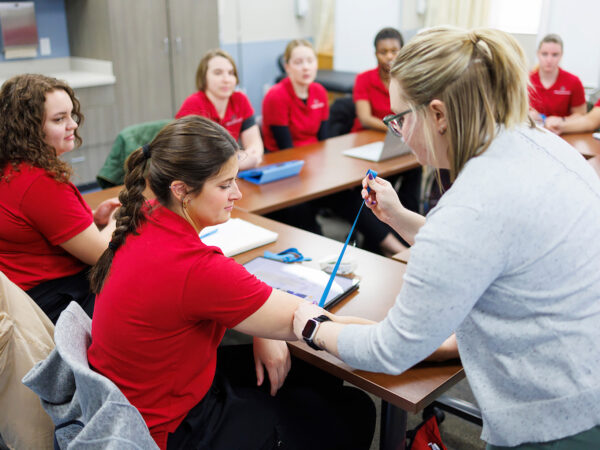Master of Science in Nursing:Family Nurse PractitionerHenry Predolin College of Health Sciences
Why Earn Your MSN as a Family Nurse Practitioner
The MS in Nursing Family Nurse Practitioner (FNP) concentration is designed for nursing professionals seeking to expand their scope of practice to providing direct care for patients across the lifespan. Through didactic courses in advanced pathophysiology, advanced physical assessment, advanced pharmacology, and differential diagnoses as well as advanced practice clinical experiences, this program imparts the expertise needed to manage the primary health care needs of patients, families, and the community. Graduates will be eligible to sit for the Family Nurse Practitioner certification exam.
We offer two tracks to reach your educational and professional goals of becoming a Family Nurse Practitioner (FNP). You can choose to either complete only the Master of Science in Nursing (MSN)-FNP or continue on to add on the Doctor of Nursing Practice (DNP)-Executive Leadership degree as well.
The advantage to Edgewood University’s program structure is that after receiving the MSN-FNP, you can seek certification as a FNP and work in that capacity while continuing on with your doctoral level coursework to also complete the DNP.
Madison, WI
Virtual
45
January 20, 2026
Join us for our MSN Information Session
Learn more about the MSN program at Edgewood University. We’ll discuss program, courses, application, and your questions. Register for an online session below:
- No sessions currently. Please reach out to gps@edgewood.edu
All sessions are in Central Daylight Time
Careers as a Family Nurse Practitioner
Featured Courses
NRS 680 – Differential Diagnosis
Course designed for advanced practice nursing students to enhance assessment skills, formulate differential diagnosis, and develop therapeutic interventions for patients across the lifespan.
NRS 696A – Equity/Management Diverse Populations
This course is designed for advanced practice nursing students to develop and enhance skills engaging with and understanding of diverse populations. We will be exploring issues of health disparity and bias, and expanding on skills in interviewing patients across cultures. We will also be addressing unique aspects of care when working with special populations such as BiPOC, LGBTQ+, children, geriatrics, pregnant women, veterans, medically-complex individuals, and patients with trauma history.
NRS 703 – Advanced Pharmacology
This course prepares nurses for professional roles in advanced nursing practice with knowledge of pharmacological principles of medications commonly prescribed to prevent and/or manage adverse health conditions of patients across the lifespan.
Course Information and Schedule
The majority of coursework for all MS in Nursing programs will be delivered in an online format (Practicum and Advanced Practice Clinical Courses require face-to-face meetings and in-practice hours). Most courses are offered over 8-week sessions. Students should speak to their advisor if they have further questions regarding the format of course facilitation.
Students may be able to complete the comprehensive program in two years by taking two courses each semester; Students may be able to complete the CNS or NP programs in three years by taking two courses each semester.
Students can enter the programs at the beginning of any session. Although students do meet with an advisor to plan out their course sequences, these plans may change during the student’s time in the program. The time to complete this degree depends on the number of courses taken per semester and communicating with the advisor regarding any changes in the course plan.
MSN-Family Nurse Practitioner
- 45 Total Credits
- Completed in 3 years (full time)
- Full or part time options
- Fully online
MSN-Family Nurse Practitioner and DNP-Executive Leadership
- 66 Total credits
- Completed in 5 years (full time)
- Full or part time options
- Fully online
MSN Family Nurse Practitioner with DNP Pathway Sample Course Schedule
Accreditation
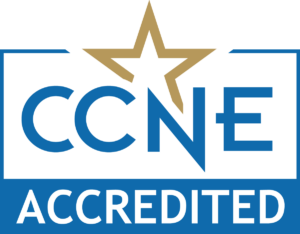
The Master of Science in Nursing program at Edgewood University is accredited by the Commission on Collegiate Nursing Education (CCNE), 655 K Street NW, Suite 750, Washington, DC 20001, 202-887-6791. The program is also approved by the State of Wisconsin Board of Nursing.
Frequently Asked Questions
What are the admission requirements for this program?
- Provide evidence of a baccalaureate or more advanced degree from a nursing program accredited by a national nursing accreditation body with a cumulative grade point average of at least 3.0 on a 4.0 scale for regular admission status. The cumulative grade point average is computed on the highest degree held at the time of application to the Edgewood University graduate program.
- Complete and submit graduate application to Graduate and Professional Studies Admissions.
- Request that official transcripts for all undergraduate and graduate academic credits received from any post-secondary institutions be sent directly to Graduate and Professional Studies Admissions.
- Provide two letters of recommendation from nursing supervisors, and/or colleagues who can focus on the candidate’s probability of success in graduate school.
- Submit a written statement, no more than 500 words, addressing your ambition to be admitted specifically into Edgewood University’s MSN program. Please also comment on your past educational and professional experiences that will foster your growth and success in this program.
- Currently hold a license as a registered professional nurse.
- Prior to beginning the MSN program’s practicum requirements, students will be required to complete a health form, criminal background check, and proof of a current RN license from the state/country in which they plan to complete their practicum.
Application Deadlines:
- August 1st for fall
- January 1st for spring
- May 1st for summer
**Note application process exception for candidates who already have an Edgewood University BSN: Those who have earned a BSN from Edgewood University within the past 3 years, received at least a 3.0 GPA, and have obtained the registered nurse license are guaranteed admission into the MSN program upon application. No further application materials need be submitted. If a candidate has not met the minimum 3.0 GPA requirement, he/she must apply and meet all of the admission requirements to be considered for admittance.
What are the goals of this program?
The MS in Nursing program will prepare advanced role (Comprehensive) and advanced practice (CNS and NP) nurses who will:
- Integrate scientific findings from nursing, biopsychosocial fields, genetics, public health, quality improvement and organizational sciences for the continual improvement of nursing care across diverse settings.
- Evidence leadership skills needed that emphasize ethical and critical decision making, effective working relationships, and a systems perspective.
- Articulate methods, tools, performance measures, and standards related to quality, as well as apply quality principles within an organization.
- Apply research outcomes within the practice setting, resolve practice problems, works as change agents, and disseminate results.
- Use patient-care technologies to deliver and enhance care and use communication technologies to integrate and coordinate care.
- Intervene at the system level through the policy development process and employ advocacy strategies to influence health, health care, and health policy.
- Act as a member and leader of inter-professional teams, communicate, collaborate, and consult with other health professionals to manage and coordinate care for individuals and populations.
- Apply and integrate broad, organizational, client-centered, and culturally-appropriate concepts in the planning, delivery, management, and evaluation of evidence-based clinical prevention and population care and services to individuals, families, and aggregates/identified populations.
- Develop strategies to achieve quality outcomes in care delivery with respect to fiscal and human resources.
- Apply management, leadership, and systems theory to the design and implementation of services in a health care system.
- Practice independently and collaboratively with an interprofessional team while delivering direct and indirect care services in various types of health care systems to promote health, prevent disease and improve the health status of diverse individuals, families, communities, and populations.
- Value life-long learning and continuing professional development.
Does this program require a background check?
The SoN and all clinical agencies under contract to the School require that every student and faculty member have a background check completed by the Criminal Justice Department of Wisconsin. Students must complete Background Information Disclosure forms before entry into the Nursing Practicum or Advanced Practice Clinical courses. Background checks are completed at the student’s expense.
Are there any health requirements for this program?
Before entering the Nursing Practicum or Advanced Practice Clinical courses, students must provide evidence of meeting the health requirements for the agency in which they complete the Practicum or Advanced Practice Clinical.
